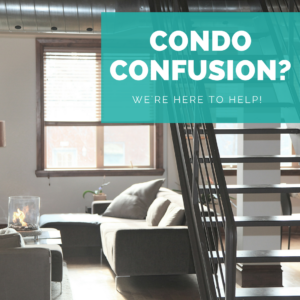Understanding Condominiums

Condominiums can be confusing.
On the outside looking in, there’s a lot of misconceptions that people carry about condos – and we thought it was time to shed some light on the subject.
To understand condominiums you first need to define them. The average person might tell you a condo is just a fancy apartment unit you own. And while, it’s on the right track – it’s not entirely true.
A condo is a privately owned residence in a building or community with multiple units. Many of which can be your traditional units contained within a larger building (apartment style), but there are detached condominiums. All condos will share common use areas like garages, fitness centres, hobby rooms, etc. that are maintained by the condominium corporation and not the individual – making upkeep that much easier.
Shared common areas, however, mean someone has to foot the bill -and with that enters “Condo fees”.
Condo fees are paid by the condominium owner to the condominium corporation. What these fees go towards will vary between the different corporations, but it may include many of the following: utility costs, insurance, security, landscaping, maintenance, property tax, parking, Central Air Conditioning, snow removal, etc.
Any condominium corporation worth its salt should be collecting more funds than necessary to cover expenses; with this, they should create a healthy reserve balance for updates, renovations and major repairs (think of it as a rainy day fund).
Without a healthy reserve, you could find yourself subject to a pesky special assessment. These assessments often occur when the unexpected strikes and funds are not available to cover the full cost. For example, if your roof caves in, and the reserves are low, the remaining balance will be split amongst the owners in the condominium.
Rent or Buy?
At the end of the day it will all come back to this question. If you’re on the hunt for affordable housing in a major metropolis a condominium can be extremely attractive. If you have long term plans for staying in the city, owning a condo can allow you to grow your equity in your real estate investment. A trusted real estate agent can ask the right questions to determine if condo living is a good fit for your and your priorities.
Alternatively, if you are only prepared for a short-term commitment to city living, a condominium may not be the best fit. Don’t forget that your real estate agent can also help you get into the rental property of your dreams at no cost to you.
Right now there are 1107 condominiums out there in the Ottawa market … talk to us today to learn more about which one is right for you!
Leave a Reply

